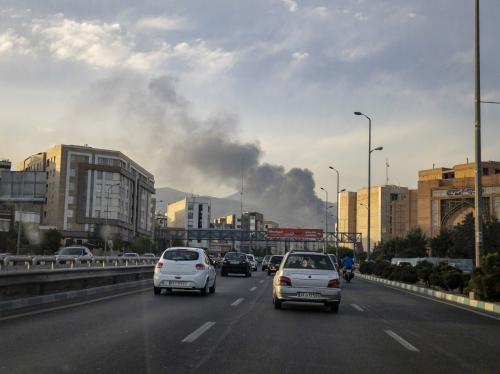View the complete index of Brookings Daily War Reports.
Saddam’s regime has fallen, but the war is not over. The coalition still faces important military missions.
A number of important towns are not yet under the coalition’s control. The most important of these is Tikrit, Saddam’s birthplace. Tikrit is a city of 250,000 people that has furnished many of Saddam’s top lieutenants and vast numbers of Republican Guards, Special Republican Guards, and other members of his internal security organizations. As a result, many Tikriti families have benefited enormously from Saddam’s ill-gotten largesse. Saddam lavished benefits on Tikrit, including new public works, greater access to food and fresh water, and subsidized luxury items. If there is any town in Iraq where the people genuinely support Saddam Hussein, it would be Tikrit.
Consequently, taking Tikrit might prove to be a difficult military task. U.S. intelligence believes that elements of the Adnan Mechanized Infantry Division of the Republican Guard have survived in Tikrit, and as many as four battalions of Special Republican Guards may also be present in the city. Additionally, sizable numbers of Saddam’s Presidential Guard, Special Security Organization, and other internal security services have probably fled there.
In truth, none of these groups represents a serious military threat to U.S. and British forces. As the battles for Baghdad, Basra, Nasiriyah and elsewhere have demonstrated, coalition forces can prevail against Saddam’s loyalists—even in urban combat—with very light casualties. However, what makes Tikrit a potentially difficult obstacle is the possibility that the civilian population itself will actively support Saddam’s loyalists.
So far, in all of the cities in which coalition forces have battled Iraqi Republican Guards or irregulars the local populace has not been a factor. Most of the populace wanted Saddam gone and while few were willing to assist the coalition actively for fear of Saddam’s retribution in the event he prevailed, even fewer actively abetted the Fedayeen Saddam, Republican Guards, or other regime forces. In Tikrit, there is the real possibility that the civilian population itself will take to the streets and actively participate in the city’s defense—creating exactly the kind of problems the U.S. military faced in Mogadishu.
Of course, it is at least equally possible that the demoralizing effect of seeing the regime fall so easily elsewhere in the country will convince even the Tikritis that Saddam is not worth dying for. But in war, it pays to be prepared for the worst, and Tikrit might be the worst.
Beyond Tikrit, there are still other pockets of resistance, and bands of the regime’s irregulars who continue to fight on. coalition military forces will need to locate them and root them out, but doing so is only half the challenge. Of greater importance will be winning the support of the Iraqi people themselves. After all, if the Iraqi people are willing to assist coalition forces by betraying the whereabouts of Saddam’s irregulars, the residual threat they pose can be eliminated very quickly. In contrast, if the populace turns against the coalition, Saddam’s remaining loyalists could become the nucleus for a larger insurgency.
It is for this reason that the most important military mission of all for coalition forces is to throw a security blanket (in all senses of the word) across Iraq. Right now, Operation Iraqi Freedom faces a crucial challenge—not from Saddam’s paltry remaining military forces but from the lawlessness threatening to snowball across the country. If coalition troops do not move into Iraq’s cities to stop the looting, retributions, and internecine fighting, the Iraqi people are likely to turn against the United States and Britain very quickly. It is not enough to bring justice and freedom to Iraq, we must also bring safety and stability.
What’s more, we cannot forget that behind the current spate of lawlessness lurks the specter of real chaos, a descent which once started is difficult to reverse. For all of these reasons, getting sufficient troops into Iraq to stabilize the cities currently under coalition control must be job one—even ahead of subduing Tikrit, which while nettlesome does not threaten to undermine the objectives of the campaign. American and British forces don’t like the role of peacekeeper, but they are going to have to play it if they are not going to lose the war they have worked so hard to win.
The Brookings Institution is committed to quality, independence, and impact.
We are supported by a diverse array of funders. In line with our values and policies, each Brookings publication represents the sole views of its author(s).


Commentary
Op-edThe Struggles Ahead in Iraq
April 11, 2003